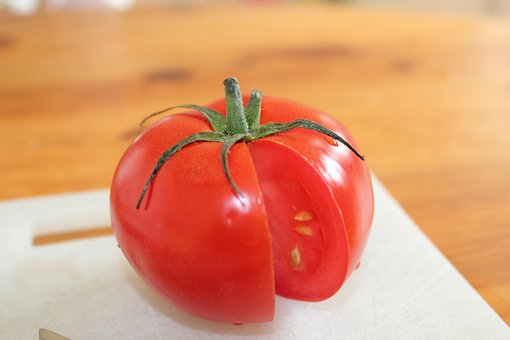No food straddles the line between fruit and vegetable more famously than the tomato.
没有什么食物比番茄更能横跨水果和蔬菜。
And while your elementary-school teacher or know-it-all friend may have informed you that tomatoes are technically fruits, the answer isn't so clear-cut. In reality, tomatoes are both fruits and vegetables at the same time.
许你的小学老师或某个博学朋友曾经告诉过你:从严格意义上讲,番茄属于水果。但其实,答案并非如此分明,番茄的确既是蔬菜也是水果。这是因为“水果”有两种不同的定义。

The explanation lies in the two different ways that "fruit" is defined. First, it is true that scientifically speaking, tomatoes are fruits.
首先,从科学角度讲,番茄属于水果,这点的确没错。
According to Merriam-Webster, a fruit is "the usually edible reproductive body of a seed plant." In a blog post, the dictionary explained it in simpler terms: "Any thing that grows on a plant and is the means by which that plant gets its seeds out into the world is a fruit."
韦氏词典告诉我们:水果通常是“种子植物的可食生殖部位”。此外,它还作出了更简单的解释:“水果是长在植物上、能够将植物种子带到外部世界的东西”。
That definition includes apples, tomatoes, and anything else that grows from a plant and contains seeds. (Cucumbers, peppers, pumpkins, and avocados are all fruits too, according to science.)
这个定义包括了苹果、番茄等任何包含种子的植物部位。从科学意义上讲,黄瓜、胡椒、南瓜、牛油果都属于水果。
Vegetables, on the other hand, have a slightly murkier definition. It's a word we use to group together a wide range of plants whose parts are edible and herbaceous, like roots, stems, and leaves. The critical distinction is that, according to the dictionary, a vegetable must be part of a plant or the whole plant itself, while fruits are just the means by which certain plants spread their seeds.
然而,蔬菜的定义要模糊得多。通常,我们用这个词指代一大批具有可食草本部分(如根、茎、叶)的植物。根据韦氏词典,蔬菜和水果的关键区别是:蔬菜必须是植物的一部分或整体植物本身,而水果只是特定植物传播种子的方式。
"The thing a tomato plant produces isn't a part of the plant itself, any more than the egg a chicken lays is part of the chicken, or the apple is part of the tree on which it grew," Merriam-Webster wrote.
Merriam Webster写道:“番茄不是植物本身的一部分,就像蛋不是鸡本身的一部分;同理,苹果也不是苹果树的一部分。”
But the confusion arises because "vegetable" isn't a botanical classification so much as it is a culinary one. And "fruit" can be a culinary term, too — described as "having a sweet pulp associated with the seed" and "used chiefly in a dessert or sweet course," according to Merriam-Webster. So scientifically, fruits don't have to be sweet, but in the kitchen, most people would classify the fruits that fall on the savory side, like tomatoes, as vegetables.
但问题在于:“蔬菜”不是一种植物学分类,而更多的属于一种烹饪食材。与此同时,“水果”也可以是一种烹饪食材。根据韦氏词典:从烹饪食材的角度,水果被定义为“拥有带种子的甜果肉”、“主要用于甜点”的东西。也就是说,从科学角度看,水果不必是甜的;但从烹饪角度看,大多数人会将用于做菜的水果(如番茄)归类为蔬菜。
Nutritionists recognize the terms as they are commonly used, and tomatoes are listed as a vegetable under USDA guidelines.
在美国农业部(USDA)的指导方针里,番茄被列为蔬菜。
Even the Supreme Court has weighed in on the issue. In 1893, the high court was forced to rule on whether imported tomatoes should be taxed under the Tariff Act of 1883, which only applied to vegetables and not fruits. Although both sides cited dictionary definitions of the two words, the court sided unanimously with #TeamVegetable.
甚至连美国最高法院都曾介入过这个问题。1893年,最高法院作出裁决,进口番茄应该按蔬菜进行征税。
Justice Horace Gray summed up the argument succinctly:
法官Horace Gray作出简单总结:
"Botanically speaking, tomatoes are the fruit of a vine, just as are cucumbers, squashes, beans, and peas," Gray wrote in the court's opinion."But in the common language of the people … all these are vegetables which are grown in kitchen gardens, and which, whether eaten cooked or raw, are, like potatoes, carrots, parsnips, turnips, beets, cauliflower, cabbage, celery, and lettuce, usually served at dinner in, with, or after the soup, fish, or meats which constitute the principal part of the repast, and not, like fruits generally, as dessert."
从植物学上讲,番茄是藤本植物的水果,就像黄瓜、南瓜、豌豆、蚕豆一样。但在人们的日常语言中,这些都是种在菜园里的蔬菜。它像土豆、萝卜、欧洲萝卜、芜菁、甜菜、菜花、卷心菜、芹菜、生菜一样,无论生吃还是熟吃,通常都是在晚餐里搭配着汤、鱼、肉一起吃。它构成饮食的主要部分,而不像水果一样,通常作为甜点。
